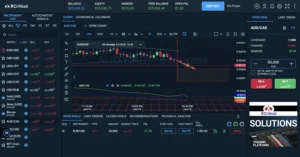Using the services provided by a discount broker (DB), budget-conscious investors purchase and sell assets at affordable fees. Finding a trusted DB is the first step toward establishing a beneficial partnership. However, unlike full-service brokerage platforms, such solutions require traders to make independent decisions without the assistance of experienced professionals. The popularity of such companies signifies the increasing democratization of investing. Discount brokers allow their clients to build strong, diversified portfolios, including stock shares, exchange-traded funds, and securities. People from various backgrounds get access to financial tools. In this guide, we will explore the principles of DB platforms and demonstrate how individuals and organizations leverage them to maximize gains.
Understanding Discount Brokers
DBs allow investors to enjoy low-cost trading opportunities and purchase securities without paying high fees charged by other platforms. They provide affordable services via web-based sites or mobile apps. Such products are built specifically for those who have some prior experience with assets and do not need to rely on third-party assistance to place buy and sell orders. Their primary features include the following:
- An extensive choice of assets: Traders get access to bonds, stocks, and other types of assets.
- Low thresholds: Reasonable minimum entry requirements;
- Affordable access to various investment options: Investors engage in commission free trading or benefit from small fees.
Every DB firm is obliged to register with the SEC, making it a secure option for those who want to remain compliant. Such entities are also regulated by FINRA and SIPC. Asset holders who want to expand their portfolio should look for online platforms that do not set minimum account requirements and have low commissions. When engaging in discount trading, market participants still enjoy government protection, as DBs safeguard clients’ money and follow existing regulations.


Turnkey Brokerage Solution For Your Business
Get the most profitable fully licensed fx/crypto brokerage software or ready-to-operate business in 48 hours. Best-in-class web & mobile trading platforms, sales-driven CRM, full integration with MT4/5, and 150+ payment providers.
How Do Discount Brokerages Work?
Every DB service prioritizes investors’ decisions and gives them the freedom to implement complex strategies to achieve their financial goals. Users can choose between tax-advantaged or taxable accounts. Besides, they can invest any amount without worrying about thresholds.
Traders consider the stocks they are interested in and set their minds on the assets they want to purchase. When making an exchange traded investment (ETF), each holder can decide when it’s the right time to sell their shares. Trade execution processes are quite streamlined and intuitive.
DB clients enjoy diminished fees, allowing them to exploit a wealth of opportunities. They can access all sorts of assets, including IPO stocks. A discount brokerage platform has handy tools to help users grasp the peculiarities of IPO processes and prices. After comparing the available options, a trader can make a weighted decision regarding the amount they want to invest.
DB services are in high demand among investors with different skills and backgrounds. However, they are hardly suitable for venture capitalists, clients who are interested in hedge funds, or people with extensive asset portfolios.
Full-Service Broker vs. Discount Broker
Functioning as intermediaries, DB companies assist members with trade finalization, allowing them to conduct various operations with securities. Below, we have outlined different types of brokers available on the market now:
- Full-service: These platforms make it easier for registered members to fulfill trades. In addition, they enable them to access recommendations provided by the industry’s experts. Investors pay high fees to get notified about lucrative opportunities and conduct profitable trading.
- DB: While they provide a more limited choice of services and do not prioritize offering personalized investment tips, these platforms have affordable commissions. They are best suited for users who already know something about potentially valuable securities and do not need to rely on in-depth analysis conducted by experienced specialists.
After comparing a full service broker vs discount broker, it becomes obvious that the latter enables clients to access niche markets and facilitate conducting transactions. Unlike the former, they do not have increased fees, which makes their offerings more appealing.
Pros of Discount Brokers
Many market participants were quick to recognize the advantages of using the services provided by DBs. Even though full-service solutions are perceived as more reliable by many traders, DBs facilitate entering markets and accessing financial tools with minimal investments. Here are the key advantages of such services:
- Affordability: Most traders focus on commissions when comparing brokerage platforms. Unless a trader wants to spend a fortune on advanced research tools, using a DB may be a better option to consider. Such services have appealing fees and do not charge extra money for the services a user may not even need.
- Convenience of use: Investors can access DB services via apps and online-based sites with ease. It allows them to exploit lucrative opportunities and finalize transactions without delays.
- A choice of investment options: Whether a person wants to purchase IPO stock, commodities, low fee mutual funds, or options, they will find a suitable asset via a DB. Such brokers cater to the needs of their clients, helping them build diversified portfolios without wasting money on unreasonable fees.
- Self-directed trading: Traders who do not need guidance when deciding what stocks to buy prefer to use DBs to make independent decisions on the degree of diversification of their portfolios.
Despite some notable benefits of using DB services, some holders voice their concerns over the functionality of such platforms.

Cons of a Discount Broker
Many beginners have doubts when they are encouraged to use DBs. Even though such solutions may seem a cost-effective alternative to other tools, they do not allow their members to access professional expertise and communicate with top-level specialists to learn more about the potential risks of some trading operations. Nobody guides the clients of discount brokers or helps them make result-yielding decisions.
Before deciding on whether such services are a suitable option for a trader, it’s worth considering their most notable shortcomings:
- Limited client support: Every brokerage firm offers a different level of service. Some platforms strive to provide top-level assistance to users, while others let them solve their issues by themselves.
- The amount of fees: Even though some brokers advertise their services claiming that the members do not have to pay commissions to conduct operations with stocks and ETFs, they forget to mention that traders have to pay fees when trading other assets. In addition, they may charge fees when users utilize a phone to complete a deal.
- Limitations: Many platforms do not provide access to hedge funds or crowdfunding options, considering them too risky.
The final decision depends on a client’s willingness to expose their capital to price fluctuations and pay a specific amount to cover fees.
Choosing a Reliable Discount Brokerage
Every person who wants to explore the sources of passive income and considers investing in stocks may at some point decide to open a DB account. However, finding a reliable service provider could be arduous without knowing what services stand out for their portfolio management tools.
When looking for the DBs available on the market, it’s essential to compare them in the following terms:
- Price: A trader should decide how much they are ready to pay to purchase specific assets at a trading platform. It’s also crucial to read information about extra fees charged by a platform.
- Types of securities: Investors may need to buy a specific asset that could be unavailable on some platforms.
- Thresholds: Some services require users to make significant deposits to access their tools. It’s better to choose a discount broker with low minimum investment requirements to start experimenting with different strategies.
- Accessibility: People who prefer to conduct operations with their assets from anywhere should look for sites or apps with streamlined interfaces and extensive lists of features.
- Analysis tools: Building an impressive portfolio necessitates using research tools to make fact-based decisions and test different approaches.
- Support services: Only well-established providers engage with their clients across multiple communication channels, including phone, email, or chat. Some platforms offer personalized services to high net worth individuals (HNWI) assisting them with managing their accounts.
It’s recommended to choose a reputable DB or full service broker based on client feedback, as it will allow traders to open an account with a trustworthy provider.
Is it Safe to Use Discount Brokers?
Despite some concerns commonly associated with making deposits with DBs, investors gradually warm up to the idea of using such services to access the stocks they are interested in. DBs are reliable providers that help their clients to achieve high returns. Such brokers manage substantial amounts of assets, which demonstrates their attractiveness to those who want to increase their holdings. Industry leaders serve millions of investors by offering them safe opportunities to maximize their gains while avoiding common threats.
Most DBs became popular due to their ability to offer low broker fee opportunities. Besides, they have easy-to-navigate interfaces, making it easier to use their tools without any prior experience.
Even if a DB fails to fulfill its obligations, its clients will be protected under SIPC guarantees. They will be compensated for up to $500K in assets in case of failure. However, every person should develop a viable strategy to avoid losing funds when making the wrong investment decisions, as such losses are not covered by the government’s insurance. The choice depends on a trader’s willingness to accept losses to enjoy higher gains.
Final Thoughts
Creating an account with a DB is a cost-effective option for those who want to benefit from using brokerage services. Achieving financial stability requires traders to find an authoritative service operating within a legal field to protect funds and maintain compliance.
As DBs offer an affordable way to engage in various investment activities, they remain a popular option among traders interested in low-cost earning opportunities. Instead of striving to become rich quickly, traders should focus on building their portfolios over the years and use every chance to reduce their expenses.
As there is no one-fits-all solution suitable for every investor, it’s essential to analyze potential returns before making a commitment and investing funds. Those who already have some experience recognize the significance of zero fees and DBs as a unique opportunity to achieve consistent portfolio growth.
After considering the upsides and downsides of a discount broker, one should decide whether they are willing to take risks. Regardless of the type of asset a trader wants to invest in, learning more about the terms and conditions offered by a broker, researching the differences between platforms, and analyzing feedback are the most important steps one should take before opening their first account.






